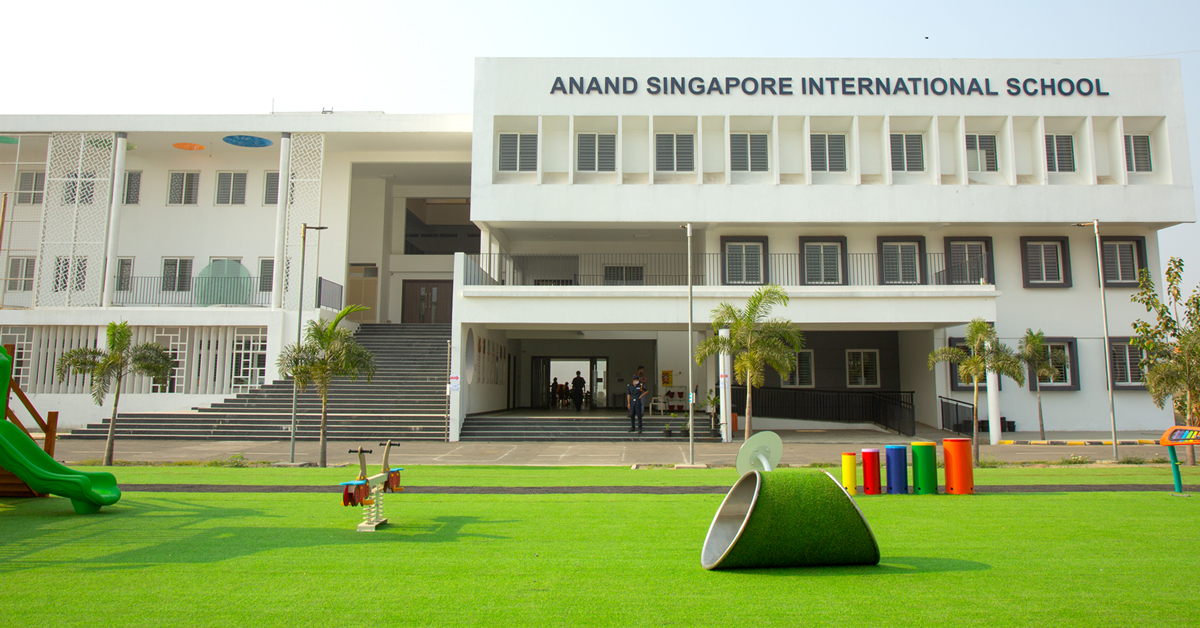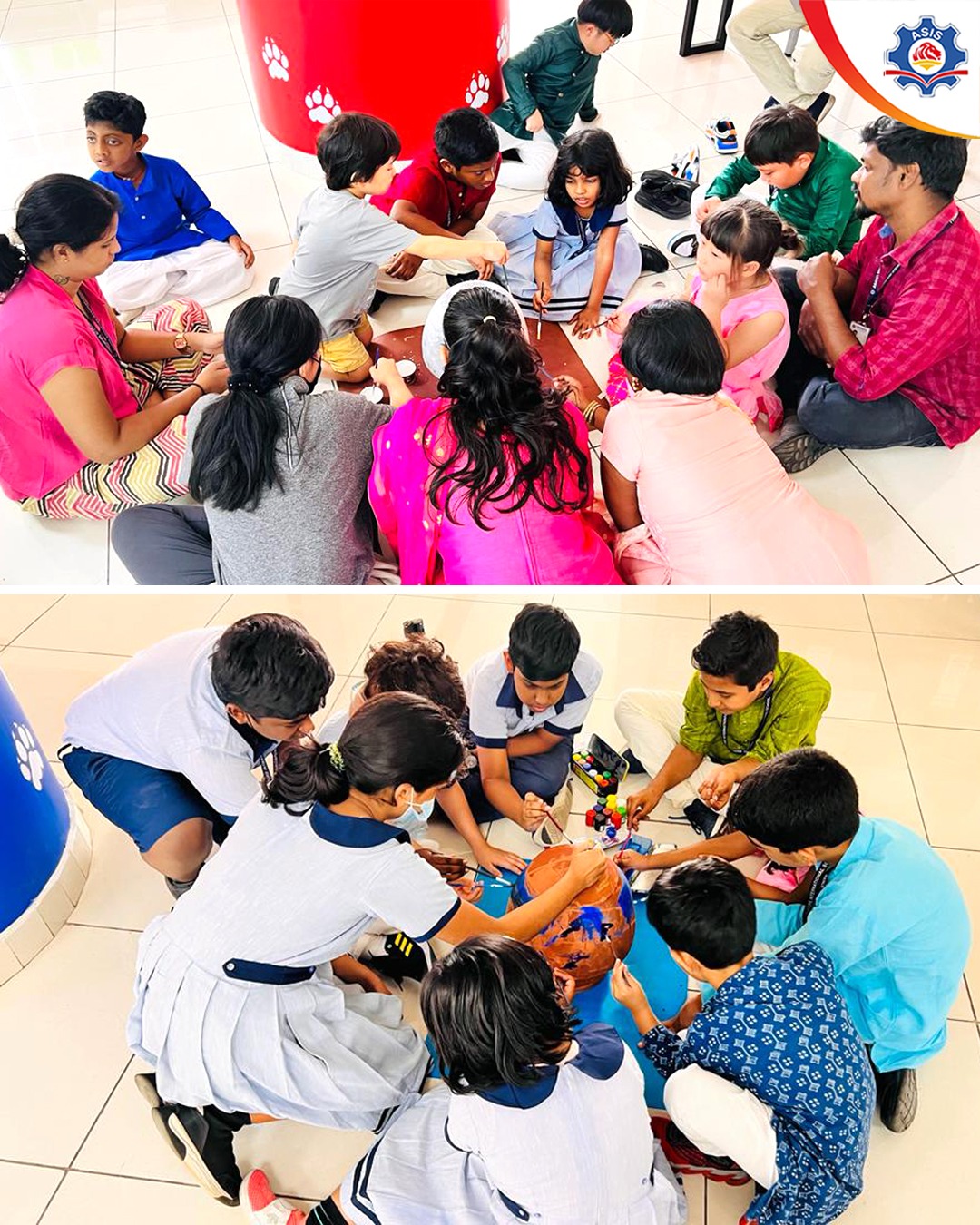What is an international school?
An international school is an educational institution that follows an international curriculum and typically caters to students from various countries and cultural backgrounds. It is a place where cultures merge to shape a truly unique educational experience where the world becomes a classroom without borders. These schools aim to provide a globally-focused education, with cultural diversity, and multilingualism. They offer programs such as the International Baccalaureate (IB) Cambridge International Examinations (CIE) or other internationally recognized curricula. They often attract expatriate families, diplomats, internationally mobile students, and local families seeking an international education for their children.

Why international education is needed in India?
Expatriate Communities: India has a significant expatriate population, including diplomats, corporate professionals, and international organizations' staff. International schools cater to these communities, providing education that aligns with their home country's curriculum or offers an internationally recognized curriculum that facilitates smooth transitions between countries.
Indian Diaspora: The Indian diaspora around the world has grown over the years. International schools in India provide educational options for Indian families living abroad who are planning to return to India. These schools ensure continuity in education, allowing students to seamlessly reintegrate into the Indian education system.

Competitive Advantage: With the increasing globalization of industries and job markets, employers often value candidates with a global perspective, cross-cultural competence, and international exposure. International education equips students with these skills, giving them a competitive advantage in their future careers.
Innovation and Entrepreneurship: International education often emphasizes innovation, entrepreneurship, and critical thinking skills. Exposing Indian students to different educational approaches and diverse perspectives, cultivates an entrepreneurial mindset, creativity, and adaptability.
Top 10 international schools in India
- The International School Bangalore (TISB)
- The British School, New Delhi
- Woodstock School, Mussoorie
- Ecole Mondiale World School, Mumbai
- Anand Singapore international school, Chennai
- International Pathways World School, Gurgaon
- Oberoi International School, Mumbai
- Dhirubhai Ambani International School, Mumbai
- American School of Bombay, Mumbai
- Indus International School, Bangalore

Why education in international schools is so Expensive?
High-Quality Standards: International schools often strive to maintain high-quality educational standards. They invest in well-trained teachers, modern teaching methods, and advanced resources, which require substantial financial resources. These schools often prioritize minimal strength per class, state-of-the-art facilities, and extracurricular programs to enhance the overall learning experience.
International Curriculum and Recognition: Many international schools adopt internationally recognized curricula. These curricula offer comprehensive and globally accepted educational programs, ensuring students receive a well-rounded education. The licensing fees, training for teachers, and continuous professional development associated with these curricula contribute to the higher costs.
Teacher Qualifications and Salaries: International schools typically attract highly qualified teachers from various countries. These teachers often have advanced degrees, international teaching experience, and specialized training, making them valuable assets for the school. Attracting and retaining such qualified teachers requires competitive salaries and benefits packages, which can contribute to higher tuition fees.
Additional Services and Enrichment Programs: International schools often offer a wide range of extracurricular activities, field trips, cultural exchanges, and enrichment programs that enhance students' overall development. These supplementary services and programs require additional resources and staffing, contributing to the overall cost.

Quality and high-standard always come at a little higher price, but they are worth compared to what it brings to the table on the mark of children’s future. Quality education can open doors to better opportunities in the future. It prepares students for higher education, professional success, and global citizenship. It equips them with the necessary skills, knowledge, and mindset to thrive in a competitive and rapidly changing world. In most of the schools Scholarships and financial aid options may also be available to make international education more accessible to a wider range of students.
Different international curricula in India and their benefits:
International Baccalaureate (IB): The IB curriculum offers a comprehensive and rigorous education for students aged 3 to 19. It is recognized globally and consists of three programs: the Primary Years Programme (PYP), the Middle Years Programme (MYP), and the Diploma Programme (DP). IB encourages critical thinking, independent research, and a holistic approach to education.
Benefits of IB:- Emphasizes critical thinking, research skills, and independent learning.
- Promotes international-mindedness and cultural understanding.
- Encourages students to explore multiple perspectives and make connections across subjects.
Singapore Curriculum: Singapore curriculum, is known for its strong emphasis on mathematics and science education. The curriculum focuses on problem-solving, critical thinking, and conceptual understanding. It also strives to provide a well-rounded education that encompasses academic, physical, and socio-emotional development. With its rigorous standards and high expectations of students, It aims to cultivate a strong work ethic, perseverance, and a love for learning. Assessments, such as examinations, are an integral part of the curriculum and serve as a means to gauge student progress and mastery of the subjects.
Benefits of the Singapore curriculum:- Emphasizes a strong foundation in mathematics and science.
- Encourages critical thinking and problem-solving skills.
- Incorporates real-world applications of knowledge.
- Promotes active learning and student engagement.
- Provides a structured and rigorous education system.
- Widely recognized by universities worldwide, including in India, facilitates admissions abroad.
- Provides opportunities for personal development through extracurricular activities.
Cambridge International Examinations (CIE): CIE offers the Cambridge Assessment International Education (CAIE) curriculum, which includes the Cambridge Primary, Cambridge Lower Secondary, Cambridge IGCSE, and Cambridge International AS & A Level programs. CIE is known for its rigorous assessments and international standards.



- Provides a flexible curriculum with a wide range of subjects and study options.
- Focuses on developing analytical and problem-solving skills.
- Offers internationally recognized qualifications for university admissions globally.
- Encourages independent research and critical thinking.
- Provides resources and support for teachers through training programs.
Advantages International education brings:
Multilingualism: International schools in India often offer language programs that facilitate the acquisition of multiple languages. This exposure to different languages enhances students' language skills and opens doors to broader opportunities in their personal and professional lives.
Cultural Diversity: International schools attract students from various cultural backgrounds, creating a multicultural and inclusive learning environment. Interacting with peers from different countries and cultures helps children develop respect, empathy, and appreciation for diversity, fostering a sense of global citizenship.
Personal Growth: The multicultural environment, exposure to different ideas, and emphasis on holistic development in international schools can contribute to children's personal growth, self-confidence, and independence.
Global Network: International schools often have a diverse and well-connected alumni network. This network can provide valuable connections, career opportunities, and support in various fields, both locally and internationally.
Higher Education Pathways: Graduates from international schools often have a range of options for higher education. The global recognition of international curricula and exposure to international universities and admission processes can facilitate entry into top universities around the world.
Reasons to choose Singapore Curriculum:
Singapore Curriculum in India: School offers the esteemed Singapore Curriculum, known for its strong focus on critical thinking, problem-solving, and inquiry-based learning. In addition to the Singapore Curriculum, we also offer the globally recognized Cambridge curriculum.
Expat Educators: Our teaching faculty consists of highly qualified and experienced educators, including a significant number of expatriate teachers. These educators bring a diverse range of perspectives and experiences, enriching the learning environment and promoting global awareness. With expatriate educators hailing from different linguistic backgrounds, language acquisition becomes an organic and immersive process for our students. Through regular interactions with native speakers, students have the opportunity to develop language skills authentically, improving their fluency and cultural competence.

Guidance for Future Endeavors: With our comprehensive Abroad Settle program, we provide tailored guidance and support to ensure a smooth transition for students seeking to pursue higher education or establish their careers abroad. We offer personalized counseling sessions to assess their academic interests, career goals, and preferred destinations for higher education or professional settlement. Our experienced counselors provide guidance on suitable courses, universities, scholarship opportunities, and career pathways that align with their individual aspirations.
Standardized Test Preparation: Many international universities require standardized test scores, such as the SAT, ACT, or IELTS/TOEFL, as part of the admission process. To equip our students with the necessary skills, we offer comprehensive test preparation courses that focus on content review, exam strategies, and practice tests. Our experienced instructors provide guidance and support to help students achieve competitive scores and increase their chances of admission to their desired institutions.
Post-Settlement Support: Our commitment to students extends beyond their admission to international universities. We provide post-settlement support, offering guidance on accommodation, local resources, and cultural adaptation. Additionally, we maintain alumni networks to facilitate networking and mentorship opportunities, ensuring that students have a supportive community wherever they choose to settle.
School Infrastructure: Our school boasts state-of-the-art infrastructure, including well-equipped classrooms, modern laboratories, a well-stocked library, and dedicated spaces for sports and extracurricular activities. We believe that a conducive environment plays a crucial role in enhancing the learning experience.
Partnership with SIS Group of Schools: We are proud to be affiliated with the world-renowned SIS Group of Schools. This partnership provides our students with unique opportunities for global collaboration, exchange programs, and access to international resources, further enriching their educational journey.
Holistic Development: We believe in nurturing well-rounded individuals. Along with academic excellence, we emphasize the development of essential life skills, character building, and fostering a strong sense of social responsibility. Our comprehensive approach ensures that students receive a holistic education that prepares them for success in all aspects of life.
Global Exposure: We provide numerous opportunities for students to engage in international exchanges, study tours, and cultural immersion programs. These experiences broaden their horizons, foster intercultural understanding, and develop a global mindset, essential attributes for success in today's interconnected world.
Parental Involvement: We value the partnership between the school and parents. Regular parent-teacher meetings, workshops, and open communication channels ensure that parents are actively engaged in their child's education. We believe that a strong home-school partnership contributes to the overall growth and success of our students.
Best International Schools in Chennai:- Anand Singapore International School, Chennai (ASIS )
- American International School Chennai (AISC)
- The British International School, Chennai
- Gateway International School, Chennai
- Abacus Montessori School, Chennai
To conclude, international schools provide a range of opportunities for children and equip them with the skills and knowledge necessary to thrive in a globalized world. Especially the education and experiences provided by international schools can serve as a foundation for children to navigate and succeed in the global environment. At ASIS international school, Chennai we are dedicated to fulfilling the aspirations of parents who seek the utmost quality education for their children. We empower our students to break the glass ceiling and emerge as trailblazers in an ever-changing and highly competitive world.
